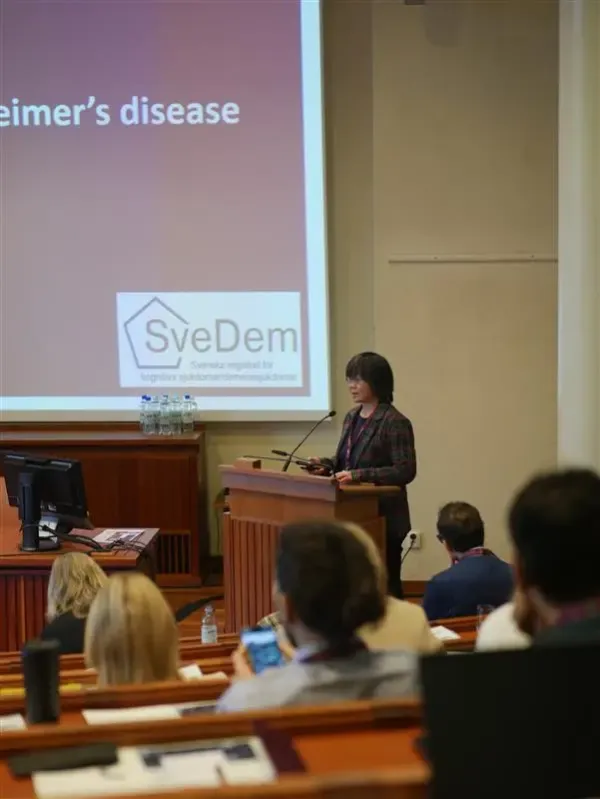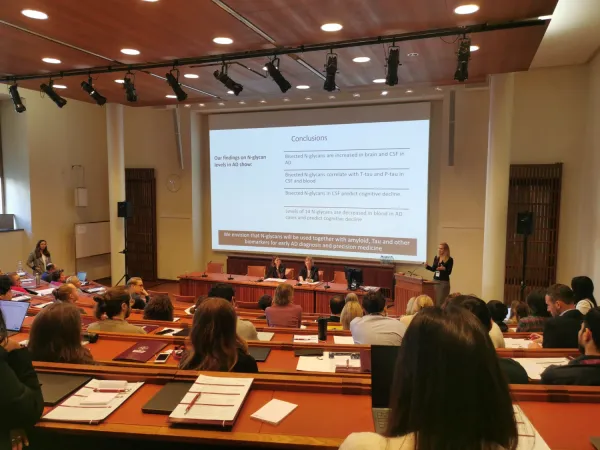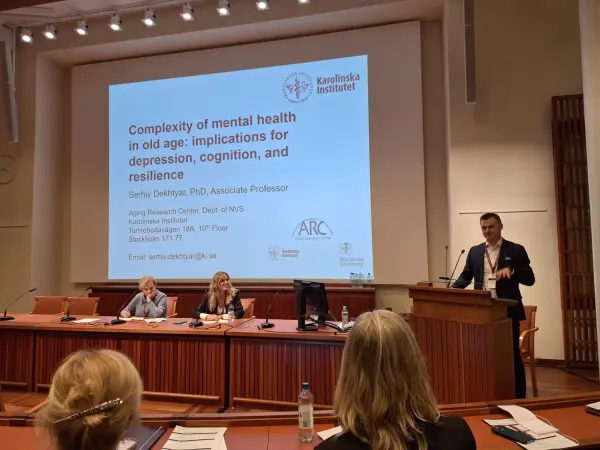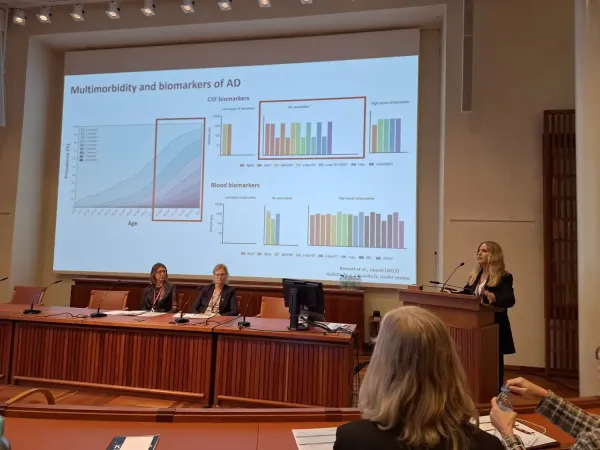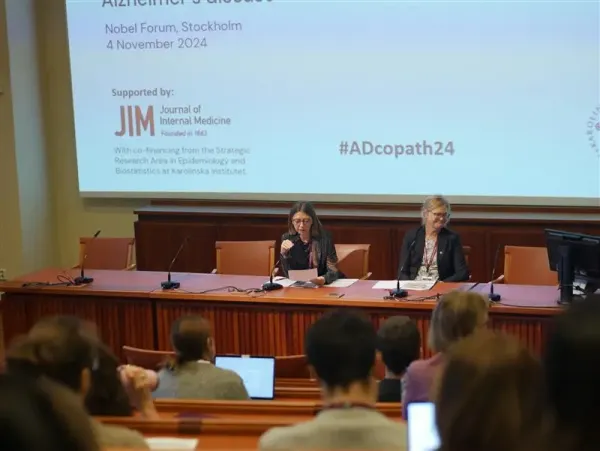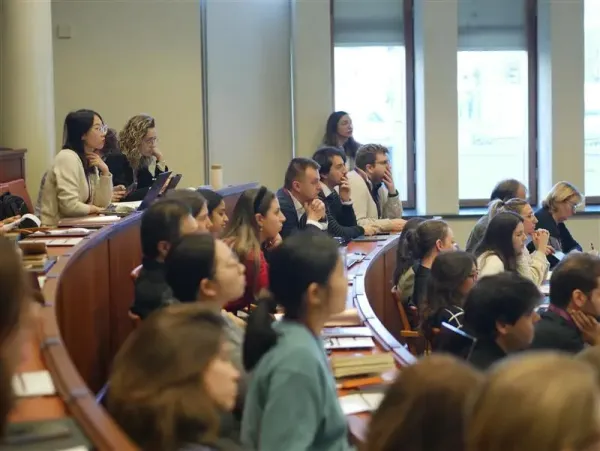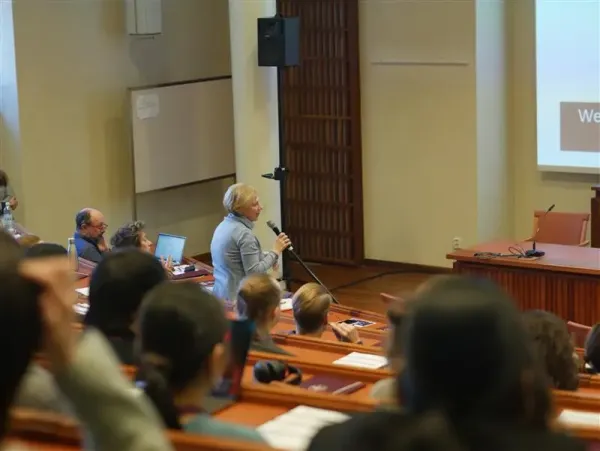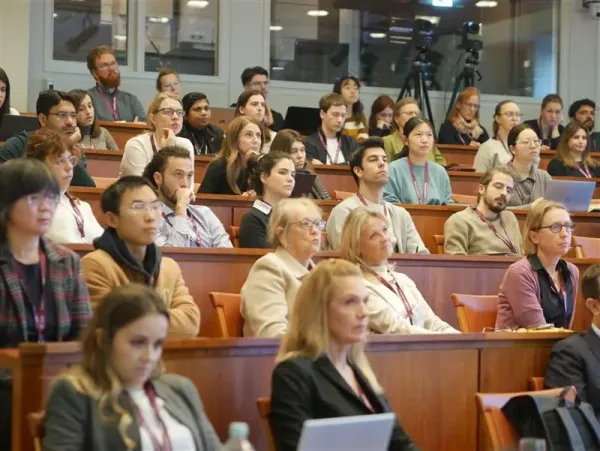On November 4, 2024, Karolinska Institutet (KI) hosted the symposium "Beyond Amyloid and Tau: The Importance of Co-Pathologies in Alzheimer's Disease" at the Nobel Forum, Stockholm. Jointly organized by the Center for Alzheimer Research (CAR) and the Aging Research Center (ARC), both part of the Department of Neurobiology, Care Sciences and Society (NVS), the event was supported by the Journal of Internal Medicine (JIM) and the Strategic Research Area in Epidemiology and Biostatistics at KI.
With more than one hundred in-person participants and additional attendees via Zoom, the symposium brought together leading experts in dementia research to explore the role of co-pathologies in Alzheimer's disease (AD).
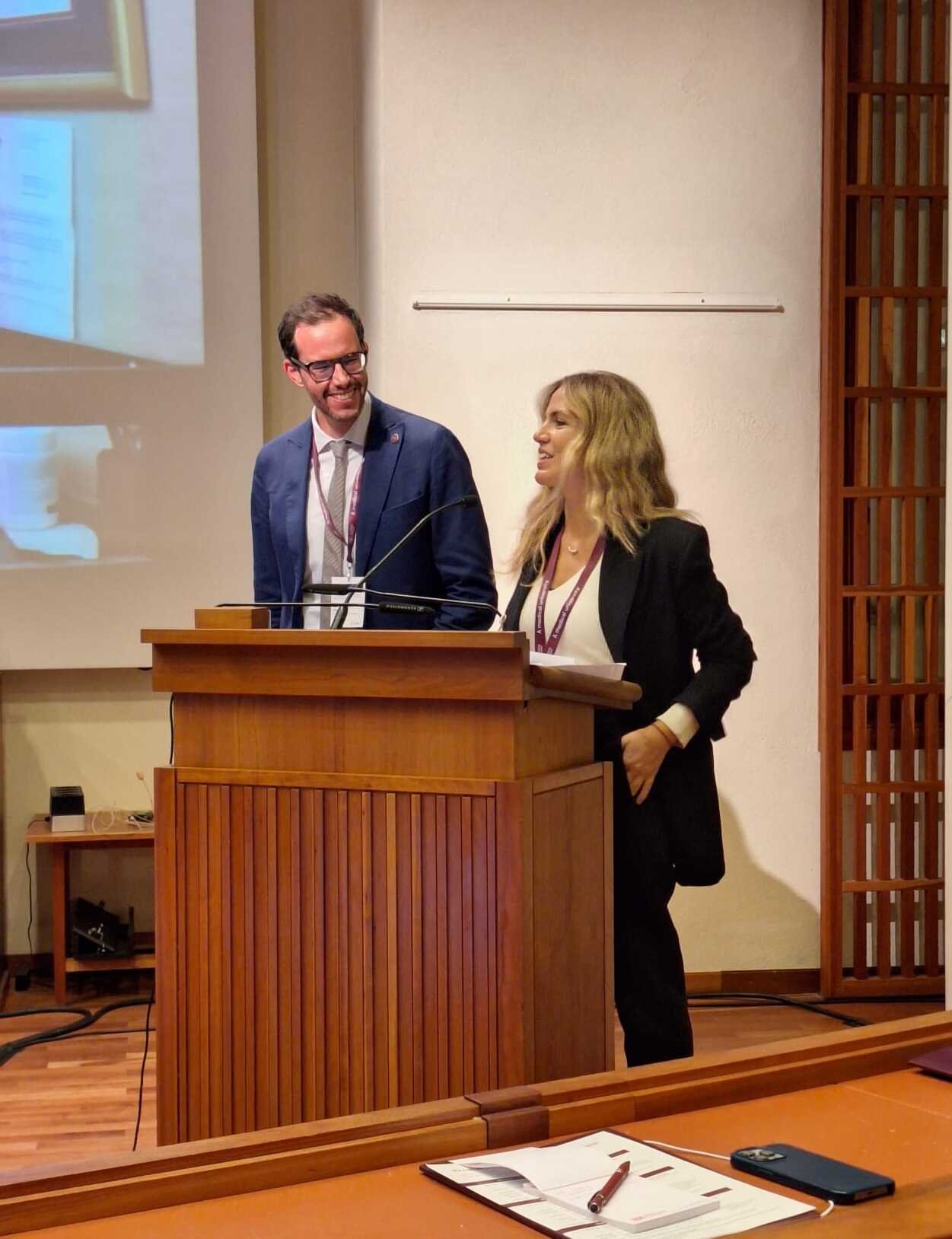
Alzheimer's disease is primarily characterized by amyloid-β plaques and tau neurofibrillary tangles. However, these hallmark lesions rarely occur in isolation. Co-occurring pathologies, such as cerebrovascular lesions and non-AD proteinopathies, are frequently found in the brains of individuals with AD. This symposium shed light on the crucial role these co-pathologies play in the development and progression of the disease.
The event featured three main sessions, each introduced by a keynote speaker, followed by contributions from Karolinska Institutet researchers representing the Center for Alzheimer Research (CAR) and its three divisions, including the Aging Research Center (ARC), the Division of Clinical Geriatrics , and the Division of Neurogeriatrics .
Potential clinical utility of Alzheimer's disease biomarkers
The morning started with a presentation by Dr. Michelle Mielke, Professor of Gerontology and Geriatric Medicine at Wake Forest University School of Medicine in the US.
She highlighted the potential clinical utility of Alzheimer's disease biomarkers measured in the blood as reliable indicators of disease pathology and as predictors of future dementia. However, she also emphasized that various factors, including chronic conditions such as kidney dysfunction and obesity, can influence the biomarker levels. This underscores the impact of comorbidities on the interpretation of Alzheimer's blood biomarkers and the need for tailored approaches when assessing people with such conditions.
Mechanisms underlying Alzheimer's disease
Dr. Bart de Strooper, professor of molecular medicine at the KU Leuven and VIB, Belgium and professor in dementia research at the University College London, UK, reviewed the mechanisms underlying AD, particularly the role of microglial dysregulation at critical inflection points from amyloid-β deposition to abnormal tau pathology and neuronal loss.
He emphasized the involvement of neuronal death through necroptosis in Alzheimer's disease and highlighted that manipulating this pathway could offer potential therapeutic approaches. However, he also argued that treatment should focus on early stages, with targeting soluble amyloid-β using gamma-secretase modulators, which hold great promise for the prevention and treatment of Alzheimer's disease.
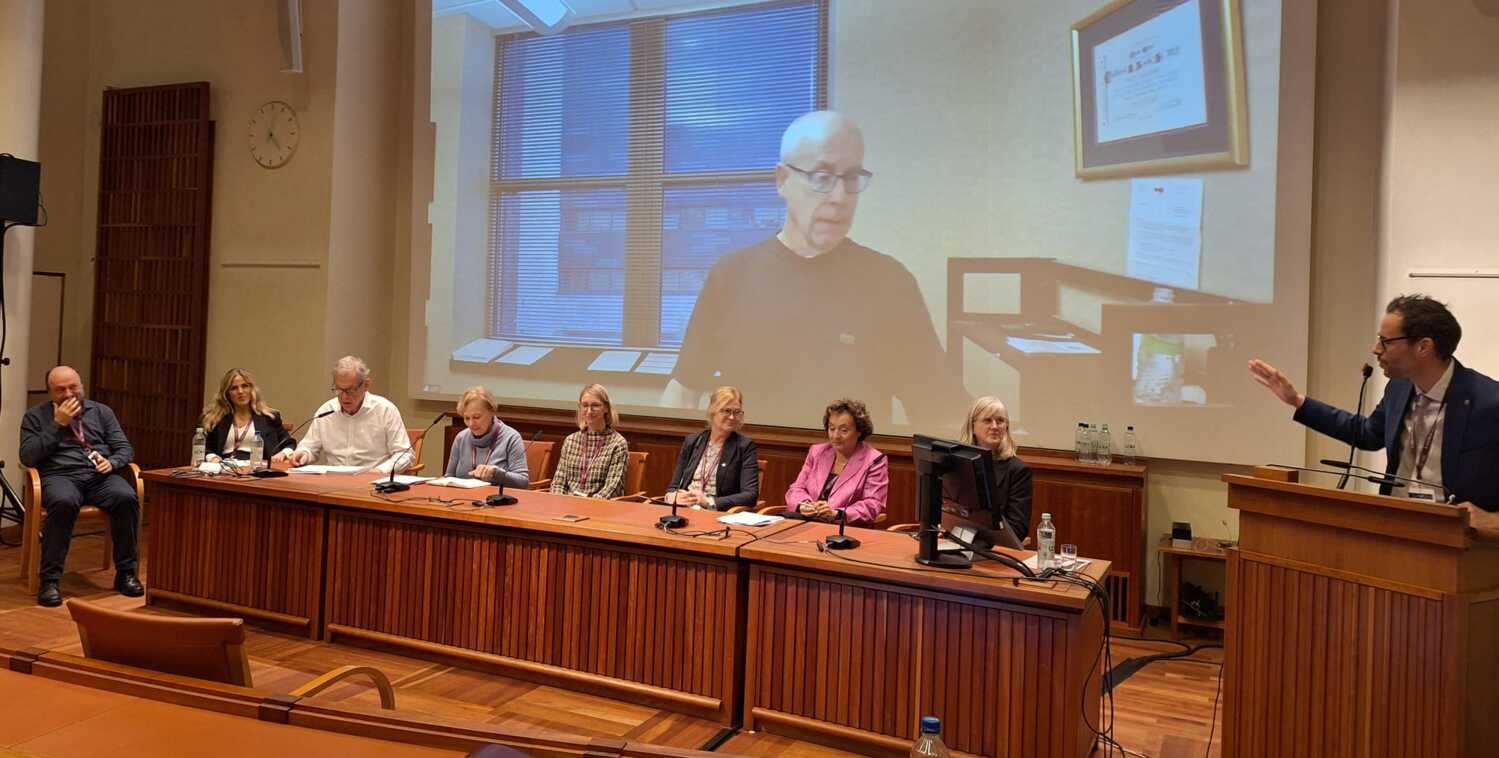
Revised criteria for diagnosis and staging of Alzheimer's disease
The day finalized with the lecture by Dr. Clifford R Jack Jr, Professor of Radiology at Mayo Clinic in the US. He introduced and explained the revised criteria for diagnosis and staging of Alzheimer's disease. He highlighted the importance of considering Alzheimer's disease as a biological disease that evolves over time and can manifest clinically as the disease progresses. He explained the biomarkers that best capture the progression of the disease and enlighten the contribution of co-pathologies such as vascular brain injury and synucleinopathy towards the pathogenesis, progression and clinical expression of Alzheimer's disease. Dr. Jack also discussed the current challenges and priorities for the future research on the diagnosis and understanding progression of Alzheimer's disease.
Key topics
Several key topics were further discussed throughout the day, including the impact of somatic disease burden on dementia development in old age.
A recurring focus was on how the presence of chronic conditions, particularly common in older adults, can influence Alzheimer's disease blood biomarkers, underscoring the importance of considering these factors when interpreting biomarker results in real-world clinical settings for patients with complex health profiles, which was presented by Dr. Giulia Grande .
Chronic diseases were further explored in a talk by Dr. Hong Xu , on kidney disease and its relationship with dementia onset. Notably, studies suggest that effectively treating acute kidney injury may play a crucial role in delaying the progression from mild cognitive impairment to dementia.
Dr. Sophia Schedin-Weiss presented her research on glycans as promising early biomarkers of Alzheimer's disease. She discussed how studying glycan alterations can help identify early disease mechanisms and contribute to earlier diagnosis. She also shared insights from her work on validating glycan biomarkers, investigating subcellular mechanisms using super-resolution microscopy, and exploring the role of protein glycosylation in the pathophysiology of Alzheimer's disease.
At the mechanistic level, Dr. Luana Naia , highlighted the role of early mitochondrial dysfunction in Alzheimer's brain and how extracellular vesicles carrying mitochondria can be used to counteract bioenergetic deficiencies. Moreover, Dr. Ivan Nalvarte discussed the impact of sex hormone imbalances and his ongoing research on how gender-affirming hormone therapy in individuals with gender dysphoria might influence the risk of developing Alzheimer's disease.
Dr. Grégoria Kalpouzos presented novel neuroimaging findings on two emerging markers of brain aging and Alzheimer's disease. She discussed how iron overload in the brain contributes to neuroinflammation, neurodegeneration, and cognitive decline in older adults. In addition, she highlighted how reduced cerebral stiffness, measured through advanced neuroimaging,may serve as a promising biomarker of Alzheimer's disease pathology and cognitive impairment.
Dr. Anna Marseglia highlighted cerebral small vessel disease as a key driver of cognitive impairment and dementia. She emphasized the need to understand how amyloid and vascular brain changes interact in Alzheimer's disease and influence clinical progression.
Dr. Annegret Habich illustrated how the presence of alpha-synuclein co-pathology may obscure typical features of Alzheimer's disease and accelerate the course of the disease.
Dr. Serhiy Dekhtyar discussed the complexity of mental health in old age and presented data on the strong interrelationship between depression and cognitive function, and highlighted the role of resilience in mitigating the impact of brain pathology and genetic predisposition to Alzheimer's disease dementia.
Workshop
On the day following the symposium, 5 November, a dedicated workshop brought together many of the invited speakers, discussants, moderators, and organisers. The workshop provided a space for in-depth reflection and exchange, building on the themes and ideas raised during the open symposium day.
Through focused discussions in smaller groups, participants explored key scientific and conceptual aspects related to co-pathologies in Alzheimer's disease-ranging from biological mechanisms to clinical implications and methodological challenges.
These discussions laid the groundwork for the development of three collaborative review articles. The three articles will be led by the symposium organisers, Dr. Giulia Grande and Dr. Daniel Ferreira, in collaboration with Dr. Luana Naia and Dr. Silvia Maioli, who also serve as Guest Editors for the upcoming special issue of the Journal of Internal Medicine (JIM), where the articles will be published in 2025.
Support
The two-day event was funded by the Journal of Internal Medicine and the Strategic Research Area in Epidemiology and Biostatistics at Karolinska Institutet.
Scientific and organizing committee
- Giulia Grande , Aging Research Center (ARC), Department of Neurobiology, Care Sciences and Society, Karolinska Institutet
- Daniel Ferreira , Center for Alzheimer Research (CAR), Department of Neurobiology, Care Sciences and Society, Karolinska Institutet
- CAR steering group: Per Nilsson , Dorota Religa and Chengxuan Qiu

